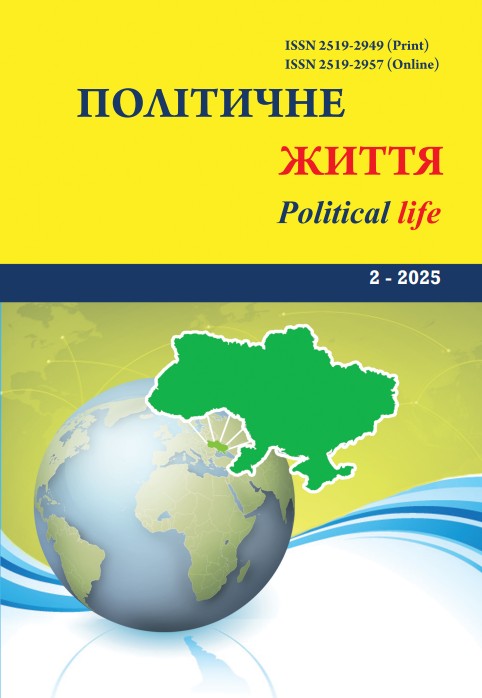Cognitive Biases in International Politics as a Factor of Political Dynamics
DOI:
https://doi.org/10.31558/2519-2949.2025.2.16Keywords:
cognitive biases, political thinking, international conflicts, behavioral approach, political settlementAbstract
This article examines cognitive biases as one of the key yet insufficiently recognized factors in international political dynamics. The modern international political system is built on the assumption that actors will behave predictably within the framework of formalized procedures and strategies. However, real political behavior often deviates from these expectations due to the influence of emotions, cognitive biases, and distorted perceptions. As a result, a system designed to ensure stability becomes vulnerable to failure precisely when actors' behavior exceeds the limits of anticipated scenarios. The hypothesis of the study suggests that cognitive biases are not random errors but systematic features of human thinking that significantly influence threat perception, political strategy choices, and prospects for peaceful conflict resolution. While behavioral approaches have gained recognition in economics thanks to the work of D. Kahneman & A. Tversky, and their followers, these mechanisms remain underexplored in political science. The author proposes a classification of cognitive biases, grouping them into five categories: biases related to information processing and thinking; biases driven by emotional processing; biases in decision-making and action; social and intergroup biases; and biases related to memory and time perception. For each group, the article analyzes their influence on political thinking and behavior, illustrated by real political cases. The study concludes that cognitive biases are not merely psychological traits of individual thinking but systematic factors influencing collective political processes at both national and international levels. Ignoring these biases in analytical models reduces the ability to explain and predict the behavior of political actors in crisis situations, thereby limiting the effectiveness of traditional approaches in international politics. The article highlights the promise of advancing behavioral approaches in political science to develop more realistic and effective strategies in an increasingly uncertain and behaviorally complex world.
References
Kahneman D., Tversky A. Prospect Theory: An Analysis of Decision under Risk. Econometrica. 1979, № 47(2), pp. 263-291.
Jervis R. Perception and Misperception in International Politics. Princeton: Princeton University Press, 1976. DOI: https://doi.org/10.2307/j.ctvc77bx3
Allison G. Essence of Decision: Explaining the Cuban Missile Crisis. Boston: Little, Brown and Company, 1971. 416 p.
Lefebvre V. Conflicting Structures. Huntington: Robert E. Krieger Publishing Company, 1977. 144 p.
Janis I.L. Groupthink: Psychological Studies of Policy Decisions and Fiascoes. Boston: Houghton Mifflin, 1972. 349 p.
Benson, B. Cognitive Biases Codex. The University of North Carolina at Chapel Hill. 2016. URL: https://www.sog.unc.edu/sites/www.sog.unc.edu/files/course_materials/Cognitive%20Biases%20Codex.pdf
Jervis, R. (1976). Perception and Misperception in International Politics: New Edition (REV-Revised). Princeton University Press. 544 p. DOI: https://doi.org/10.2307/j.ctvc77bx3
Kahneman, D., & Renshon, J. (2007). Why Hawks Win. Foreign Policy, 158, P. 34-38. URL: https://www.jstor.org/stable/25462124
Rapport, A. (2016). Cognitive Approaches to Foreign Policy Analysis. Oxford University Press. DOI: https://doi.org/10.17863/CAM.6796
Yetiv, S. A. (2013). National Security through a Cockeyed Lens. How Cognitive Bias Impacts U.S. Foreign Policy. Johns Hopkins University Press. URL: https://digitalcommons.odu.edu/politicalscience_geography_books/15/
Johnson, D. D. P. (2020). Strategic Instincts: The Adaptive Advantages of Cognitive Biases in International Politics. Princeton University Press. 392 p.
Cambridge University Press. International Organization. 2017. № 71(S1). URL: https://www.cambridge.org/core/journals/international-organization/issue/DEE65E4B7B7C8A50C4B912B7631AA970
Hafner-Burton, E.M., Haggard, S., Lake, D.A., Victor, D.G. (2017). The Behavioral Revolution and International Relations. International Organization, № 71(S1), pp. 1-31. DOI: 10.1017/S0020818316000400
Світова гібридна війна: український фронт / За заг. ред. В. П. Горбуліна. Національний інститут стратегічних досліджень. Київ: НІСД, 2017. 496 с.
Забужко О., Пашков М. Питання довіри та миротворчих стратегій у постконфліктних суспільствах. Український журнал міжнародного права, 2022, № 2, с. 45-56.
Bigelow, S. J., Gillis, A. S., Bernstein, C. (2025). What is Cognitive Bias? Informa. URL: https://www.techtarget.com/searchenterpriseai/definition/cognitive-bias#:~:text=Cognitive%20bias%20is%20a%20systematic,large%20amounts%20of%20information%20quickly.
The Decision Lab. Cognitive Biases. A List of the Most Relevant Biases in Behavioral Economics. 2025. URL: https://thedecisionlab.com/biases
Stuster, J. D. The Iraq Syndrome. Foreign Policy Magazine. 2013. URL: https://foreignpolicy.com/2013/03/19/the-iraq-syndrome/#:~:text=And%20I%20think%20the%20hardest,substantial%20WMD%20and%20WMD%20programs
Harmon, M. & Muenchen, R. Semantic Framing in the Build-Up to the Iraq War: Fox v. CNN and Other U. S. Broadcast News Programs etc. A Review of General Semantics. 2009. № 66(1), pp. 12-26. URL: https://www.jstor.org/stable/42578893
Tomes, R. On the Politicization of Intelligence. War on the Rocks. 2015. URL: https://warontherocks.com/2015/09/on-the-politicization-of-intelligence/#:~:text=In%20the%20June%202008%20press,policy%20relationships
Houghton, D. The Role of Analogies in Crisis Decision Making. Oxford Research Encyclopedia of Politics. 2020. DOI: https://doi.org/10.1093/acrefore/9780190228637.013.1634
Schelling, T. The Strategy of Conflict. Harvard University Press. 1980. 328 p.
Kennedy, R.F. Thirteen Days: A Memoir of the Cuban Missile Crisis. 1969. W.W. Norton & Company. 185 p. URL: https://wwnorton.com/books/Thirteen-Days/
Corrales, J. & Penfold, M. Dragon in the Tropics: Hugo Chavez and the Political Economy of Revolution in Venezuela. 2011. Brookings Institution Press. 185 p. URL: http://www.jstor.org/stable/10.7864/j.ctt127w6g
Weisbrot, M. Media Bias in Venezuela. Center for Economic and Policy Research. 2012. URL: https://cepr.net/publications/media-bias-in-venezuela/
Hawkins, K. A. Who Mobilizes? Participatory Democracy in Chávez's Bolivarian Revolution. Latin American Politics and Society. 2010. № 52(3), pp. 31-66. DOI: https://doi.org/10.1111/j.1548-2456.2010.00089.x
Weisbrot, M. Media Bias in Venezuela. Center for Economic and Policy Research. 2012. URL: https://cepr.net/publications/media-bias-in-venezuela/
Iodice, E. F. Lessons from History: The Startling Rise to Power of Benito Mussolini. The Journal of Values-Based Leadership. 2018. № 11(2), Art. 3. DOI: https://doi.org/10.22543/0733.62.1241
Rozenblit, L., & Keil, F. The Misunderstood Limits of Folk Science: An Illusion of Explanatory Depth. Cognitive Science. 2002. № 26(5), pp. 521-562. DOI: https://doi.org/10.1207/s15516709cog2605_1

